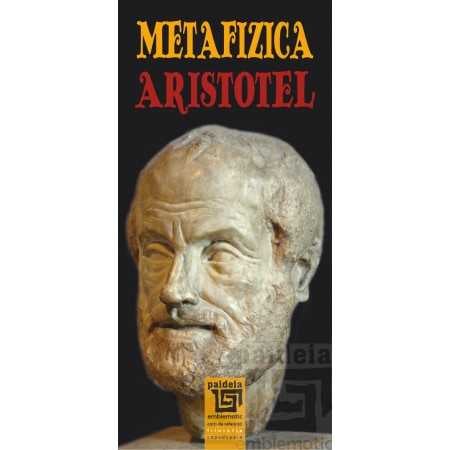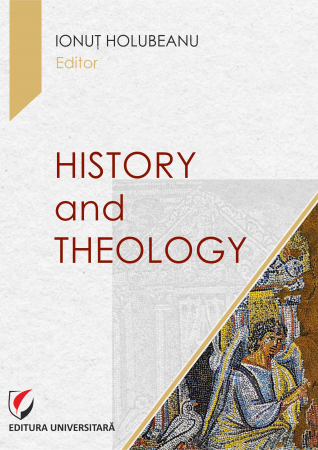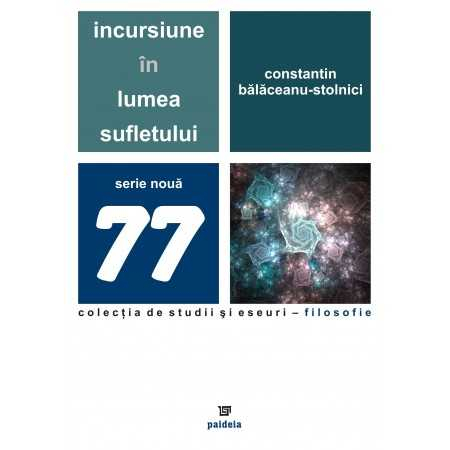Manuscript proposals: [email protected] / 0745 204 115 //// Tracking orders Individuals / Sales: 0745 200 357 / Orders Legal entities: 0721 722 783
6359.png) The importance of Christian psychopedagogy in the religious education of young people. Interfaith approach - Stefan Adrian Ghiuta
The importance of Christian psychopedagogy in the religious education of young people. Interfaith approach - Stefan Adrian Ghiuta
6359.png)
Publisher: Editura Universitară
Author: Stefan Adrian Ghiuta
Edition: I
Pages: 300
Publisher year: 2023
ISBN: 978-606-28-1655-1
DOI: https://doi.org/10.5682/9786062816551
Product Code:
9786062816551
Do you need help?
0745 200 357
- Description
- Download (1)
- Authors
- Content
- More details
- Reviews (0)
The present doctoral thesis mainly aims to analyze the interfaith and interdisciplinary dialogue (theology-psycho-pedagogy, faith-science, knowledge-science, traditions-dialogue, knowledge-mission) with an emphasis, as can be seen from the title, on the development the personality of the child and the adolescent in the current conditions of the evolution of contemporary psychology and psychopedagogy.
When Christ the Savior tells the disciples to let children turn to Him (Mt. 19:14), he refers precisely to this initiation into the wonderful world of faith, to the true pedagogy that turns the being to the source of existence, which is God.
Psychopedagogy, even special psychopedagogy, despite their very rigorously structured system, need the purposes with which ecumenical theology operates, they need a deepening of the divine origin of man and the meaning of existence - salvation or return to God and dialogue based on the foundation of fairness and principled equality between interlocutors, even when this dialogue is carried out between two fields that seem to exclude each other (science and religion).
Psychology appeared and developed as an independent science in the modern period, by detaching from the breast of philosophy, its content being made up of the doctrines about the soul issued by the great thinkers. Its birth laid the foundations for the subsequent development of several related scientific branches to understand, explain and improve the phenomena of the human psyche.
Of course, the majority of these currents of interpretation manifested and promoted a derogatory attitude towards religion, remaining to a large extent captive to the Enlightenment conception regarding the mechanistic definition of man as the measure of all things and his psyche exclusively as a self-standing, completely isolated rational unit / obscured from God and the environment.
Starting from this philosophical root, psychology together with all its branches ignored, until recent times, the religious faculty of the human soul, implicitly denying its a priori aspiration towards Divinity, understood as the transcendent Person who creates and pronates the universe, the first source and the ultimate destination of the existence and growth/progress of the human person.
Thus, the human psyche was retained and studied as such, rather like an atom floating alone in an ether impossible to describe and report, somehow similar to that Nietzschean "nihil", of Oriental-Schopenhaurian inspiration.
Socio-economic frameworks of fluid immigration have brought people from many religious backgrounds together in the places where we live. Religious traditions, until 200 years ago foreign to each other, enter the architecture of the same society, now side by side. As Francis X. Clooney remarked, "by habit, we still apply tidy labels, such as Eastern religions and Western religions, to religions that take root everywhere."
This religious diversity challenges us even more from a missionary point of view, because a vast increase in available knowledge about religions creates new learning possibilities. "By habit, some of us still imagine that other religions are only found in distant parts of the world." Religious traditions are vividly present in any kind of mass media. Never before have they been available so easily, so transparently and with such quality. Today we take note of the other through the medium of informational immediacy, being able to easily learn about other religions. Therefore, our time and place urge us to a necessary inter-religious learning, a process achieved through dialogue.
Diversity becomes a primary context for the research and self-understanding of a tradition; particular traditions in their concretization become the place where the religious meaning of diversity is revealed. “All religions are close to us; whether we are aware of it or not, they become part of our lives and influence our religious identities" Through such an interreligious experience, intelligently evaluated and extended, we give a deeper intellectual and spiritual meaning to diversity, in the light of what we find in the world around us. We can respond to diversity with a distinct set of sensitivities and perspectives that balance respect and discernment for religious traditions and the community in which they are circumscribed.
Where interreligious interaction is possible, there is also a responsibility, in that we must not artificially and arbitrarily interrupt our search to constantly understand our own faith, to which we are faithful. The multitude of information from the multi-confessional spectrum, so easily accessible, should break through religious stereotypes and free us from conventional judgments that simply persist as negative habits.
Psychology in general and psychopedagogy, as the object of our research, approaches methods from the sphere of phenomenology, still remaining in an area of exploration far from the vast vein of religious tradition, in which elements and principles of wisdom in relation to education could be identified young people. It is about a wisdom filtered by Revelation, which outlines the entire process of education from the perspective of the connection between the human person and God.
When Christ the Savior tells the disciples to let children turn to Him (Mt. 19:14), he refers precisely to this initiation into the wonderful world of faith, to the true pedagogy that turns the being to the source of existence, which is God.
Psychopedagogy, even special psychopedagogy, despite their very rigorously structured system, need the purposes with which ecumenical theology operates, they need a deepening of the divine origin of man and the meaning of existence - salvation or return to God and dialogue based on the foundation of fairness and principled equality between interlocutors, even when this dialogue is carried out between two fields that seem to exclude each other (science and religion).
Psychology appeared and developed as an independent science in the modern period, by detaching from the breast of philosophy, its content being made up of the doctrines about the soul issued by the great thinkers. Its birth laid the foundations for the subsequent development of several related scientific branches to understand, explain and improve the phenomena of the human psyche.
Of course, the majority of these currents of interpretation manifested and promoted a derogatory attitude towards religion, remaining to a large extent captive to the Enlightenment conception regarding the mechanistic definition of man as the measure of all things and his psyche exclusively as a self-standing, completely isolated rational unit / obscured from God and the environment.
Starting from this philosophical root, psychology together with all its branches ignored, until recent times, the religious faculty of the human soul, implicitly denying its a priori aspiration towards Divinity, understood as the transcendent Person who creates and pronates the universe, the first source and the ultimate destination of the existence and growth/progress of the human person.
Thus, the human psyche was retained and studied as such, rather like an atom floating alone in an ether impossible to describe and report, somehow similar to that Nietzschean "nihil", of Oriental-Schopenhaurian inspiration.
Socio-economic frameworks of fluid immigration have brought people from many religious backgrounds together in the places where we live. Religious traditions, until 200 years ago foreign to each other, enter the architecture of the same society, now side by side. As Francis X. Clooney remarked, "by habit, we still apply tidy labels, such as Eastern religions and Western religions, to religions that take root everywhere."
This religious diversity challenges us even more from a missionary point of view, because a vast increase in available knowledge about religions creates new learning possibilities. "By habit, some of us still imagine that other religions are only found in distant parts of the world." Religious traditions are vividly present in any kind of mass media. Never before have they been available so easily, so transparently and with such quality. Today we take note of the other through the medium of informational immediacy, being able to easily learn about other religions. Therefore, our time and place urge us to a necessary inter-religious learning, a process achieved through dialogue.
Diversity becomes a primary context for the research and self-understanding of a tradition; particular traditions in their concretization become the place where the religious meaning of diversity is revealed. “All religions are close to us; whether we are aware of it or not, they become part of our lives and influence our religious identities" Through such an interreligious experience, intelligently evaluated and extended, we give a deeper intellectual and spiritual meaning to diversity, in the light of what we find in the world around us. We can respond to diversity with a distinct set of sensitivities and perspectives that balance respect and discernment for religious traditions and the community in which they are circumscribed.
Where interreligious interaction is possible, there is also a responsibility, in that we must not artificially and arbitrarily interrupt our search to constantly understand our own faith, to which we are faithful. The multitude of information from the multi-confessional spectrum, so easily accessible, should break through religious stereotypes and free us from conventional judgments that simply persist as negative habits.
Psychology in general and psychopedagogy, as the object of our research, approaches methods from the sphere of phenomenology, still remaining in an area of exploration far from the vast vein of religious tradition, in which elements and principles of wisdom in relation to education could be identified young people. It is about a wisdom filtered by Revelation, which outlines the entire process of education from the perspective of the connection between the human person and God.
-
The importance of Christian psychopedagogy in the religious education of young people. Interfaith approach
Download
STEFAN ADRIAN GHIUTA was born on 18.06.1994. Followed by the Theological Seminary (2008-2012) and the Faculty of Theology (2013-2017) in Constanta. Since 2018 it is PC. Archid. within the Church "Nativity of the Mother of God" in Constanta. He holds a communication at the International Symposium "1500 years of identity and Christian community: Metropolitan Paternus in Romanian historiography" and publishes the article in 2020 as well as other studies and articles. He is a Doctor of Theology since 2023.
ABBREVIATIONS / 9
INTRODUCTION / 11
1. Choosing the title and motivation of the paper / 11
2. The purpose and objectives of the work / 14
3. Knowledge and science in the approaches of ecumenical theology / 15
4. The importance of Christian psychopedagogy in the formation of the religious-moral consciousness of young people / 20
5. The relationship between psychology-psychopedagogy and Christian pedagogy / 23
CHAPTER 1
PERSONALITY DEVELOPMENT OF YOUNG PEOPLE IN THE APPROACH OF CLASSIC PSYCHO-PEDAGOGY / 29
1.1. General characteristics of the evolution of young people. Dominant aspects of development / 29
1.2. Psychic development. Defining characteristics / 40
1.3. The evolution of affectivity, motivation and will / 54
1.3.1. The evolution of affectivity / 54
1.3.2. The evolution of motivation / 59
1.3.3. The evolution of the will / 64
1.4. Expansion of personality and behavior / 66
CHAPTER 2
DIVINE REVELATION, FOUNDATION OF THE RELIGIOUS EDUCATION OF YOUNG PEOPLE / 76
2.1. Judeo-Christian values of education / 76
2.2. Christ - the foundation of religious education / 84
2.3. Elements of Christian pedagogy in Clement of Alexandria / 88
2.4. Religious education in the thinking and work of Saint John Chrysostom / 93
CHAPTER 3
RELIGIOUS PSYCHOPEDAGOGY, COMPONENT OF CLASSICAL PEDAGOGY AND ITS IMPORTANCE IN THE RELIGIOUS EDUCATION OF YOUNG PEOPLE / 116
3.1. The characteristics of Christian psychopedagogy / 116
3.2. Common characteristics of classical pedagogy and Christian psychopedagogy / 119
3.3. Christian psychopedagogy and religious education in the context of current diversity / 122
3.4. Formation of religious-moral consciousness of young people / 125
CHAPTER 4
CHRISTIAN PSYCHO-PEDAGOGY FROM AN INTER-CONFESSIONAL PERSPECTIVE / 130
4.1. Psychology, psychopedagogy, religious education in an ecumenical context / 130
4.2. Orthodox teaching about religious education as part of Christian psychopedagogy / 135
4.3. The Catholic vision regarding the upbringing and education of young people / 158
4.4. The conception of classical Protestantism regarding religious education / 175
4.5. Neo-Protestant landmarks regarding the development of religious feeling among young people / 199
4.6. The role of religious psychopedagogy in creating an interconfessional dialogue / 202
4.7. Interfaith similarities and differences / 206
CHAPTER 5
MULTIDISCIPLINARY APPROACHES IN THE ECUMENICAL DIALOGUE REGARDING RELIGIOUS EDUCATION / 212
5.1. The relationship between theology and psychology, in the era of globalization / 212
5.2. Missionary milestones in the dialogue between science, psychology and religion / 220
5.3. The challenges of the contemporary world on Christian psychopedagogy and religious education / 222
5.4. The multidisciplinary and interconfessional dimension of psychology / 226
CONCLUSIONS / 255
BIBLIOGRAPHY / 263
INTRODUCTION / 11
1. Choosing the title and motivation of the paper / 11
2. The purpose and objectives of the work / 14
3. Knowledge and science in the approaches of ecumenical theology / 15
4. The importance of Christian psychopedagogy in the formation of the religious-moral consciousness of young people / 20
5. The relationship between psychology-psychopedagogy and Christian pedagogy / 23
CHAPTER 1
PERSONALITY DEVELOPMENT OF YOUNG PEOPLE IN THE APPROACH OF CLASSIC PSYCHO-PEDAGOGY / 29
1.1. General characteristics of the evolution of young people. Dominant aspects of development / 29
1.2. Psychic development. Defining characteristics / 40
1.3. The evolution of affectivity, motivation and will / 54
1.3.1. The evolution of affectivity / 54
1.3.2. The evolution of motivation / 59
1.3.3. The evolution of the will / 64
1.4. Expansion of personality and behavior / 66
CHAPTER 2
DIVINE REVELATION, FOUNDATION OF THE RELIGIOUS EDUCATION OF YOUNG PEOPLE / 76
2.1. Judeo-Christian values of education / 76
2.2. Christ - the foundation of religious education / 84
2.3. Elements of Christian pedagogy in Clement of Alexandria / 88
2.4. Religious education in the thinking and work of Saint John Chrysostom / 93
CHAPTER 3
RELIGIOUS PSYCHOPEDAGOGY, COMPONENT OF CLASSICAL PEDAGOGY AND ITS IMPORTANCE IN THE RELIGIOUS EDUCATION OF YOUNG PEOPLE / 116
3.1. The characteristics of Christian psychopedagogy / 116
3.2. Common characteristics of classical pedagogy and Christian psychopedagogy / 119
3.3. Christian psychopedagogy and religious education in the context of current diversity / 122
3.4. Formation of religious-moral consciousness of young people / 125
CHAPTER 4
CHRISTIAN PSYCHO-PEDAGOGY FROM AN INTER-CONFESSIONAL PERSPECTIVE / 130
4.1. Psychology, psychopedagogy, religious education in an ecumenical context / 130
4.2. Orthodox teaching about religious education as part of Christian psychopedagogy / 135
4.3. The Catholic vision regarding the upbringing and education of young people / 158
4.4. The conception of classical Protestantism regarding religious education / 175
4.5. Neo-Protestant landmarks regarding the development of religious feeling among young people / 199
4.6. The role of religious psychopedagogy in creating an interconfessional dialogue / 202
4.7. Interfaith similarities and differences / 206
CHAPTER 5
MULTIDISCIPLINARY APPROACHES IN THE ECUMENICAL DIALOGUE REGARDING RELIGIOUS EDUCATION / 212
5.1. The relationship between theology and psychology, in the era of globalization / 212
5.2. Missionary milestones in the dialogue between science, psychology and religion / 220
5.3. The challenges of the contemporary world on Christian psychopedagogy and religious education / 222
5.4. The multidisciplinary and interconfessional dimension of psychology / 226
CONCLUSIONS / 255
BIBLIOGRAPHY / 263
The present doctoral thesis mainly aims to analyze the interfaith and interdisciplinary dialogue (theology-psycho-pedagogy, faith-science, knowledge-science, traditions-dialogue, knowledge-mission) with an emphasis, as can be seen from the title, on the development the personality of the child and the adolescent in the current conditions of the evolution of contemporary psychology and psychopedagogy.
When Christ the Savior tells the disciples to let children turn to Him (Mt. 19:14), he refers precisely to this initiation into the wonderful world of faith, to the true pedagogy that turns the being to the source of existence, which is God.
Psychopedagogy, even special psychopedagogy, despite their very rigorously structured system, need the purposes with which ecumenical theology operates, they need a deepening of the divine origin of man and the meaning of existence - salvation or return to God and dialogue based on the foundation of fairness and principled equality between interlocutors, even when this dialogue is carried out between two fields that seem to exclude each other (science and religion).
Psychology appeared and developed as an independent science in the modern period, by detaching from the breast of philosophy, its content being made up of the doctrines about the soul issued by the great thinkers. Its birth laid the foundations for the subsequent development of several related scientific branches to understand, explain and improve the phenomena of the human psyche.
Of course, the majority of these currents of interpretation manifested and promoted a derogatory attitude towards religion, remaining to a large extent captive to the Enlightenment conception regarding the mechanistic definition of man as the measure of all things and his psyche exclusively as a self-standing, completely isolated rational unit / obscured from God and the environment.
Starting from this philosophical root, psychology together with all its branches ignored, until recent times, the religious faculty of the human soul, implicitly denying its a priori aspiration towards Divinity, understood as the transcendent Person who creates and pronates the universe, the first source and the ultimate destination of the existence and growth/progress of the human person.
Thus, the human psyche was retained and studied as such, rather like an atom floating alone in an ether impossible to describe and report, somehow similar to that Nietzschean "nihil", of Oriental-Schopenhaurian inspiration.
Socio-economic frameworks of fluid immigration have brought people from many religious backgrounds together in the places where we live. Religious traditions, until 200 years ago foreign to each other, enter the architecture of the same society, now side by side. As Francis X. Clooney remarked, "by habit, we still apply tidy labels, such as Eastern religions and Western religions, to religions that take root everywhere."
This religious diversity challenges us even more from a missionary point of view, because a vast increase in available knowledge about religions creates new learning possibilities. "By habit, some of us still imagine that other religions are only found in distant parts of the world." Religious traditions are vividly present in any kind of mass media. Never before have they been available so easily, so transparently and with such quality. Today we take note of the other through the medium of informational immediacy, being able to easily learn about other religions. Therefore, our time and place urge us to a necessary inter-religious learning, a process achieved through dialogue.
Diversity becomes a primary context for the research and self-understanding of a tradition; particular traditions in their concretization become the place where the religious meaning of diversity is revealed. “All religions are close to us; whether we are aware of it or not, they become part of our lives and influence our religious identities" Through such an interreligious experience, intelligently evaluated and extended, we give a deeper intellectual and spiritual meaning to diversity, in the light of what we find in the world around us. We can respond to diversity with a distinct set of sensitivities and perspectives that balance respect and discernment for religious traditions and the community in which they are circumscribed.
Where interreligious interaction is possible, there is also a responsibility, in that we must not artificially and arbitrarily interrupt our search to constantly understand our own faith, to which we are faithful. The multitude of information from the multi-confessional spectrum, so easily accessible, should break through religious stereotypes and free us from conventional judgments that simply persist as negative habits.
Psychology in general and psychopedagogy, as the object of our research, approaches methods from the sphere of phenomenology, still remaining in an area of exploration far from the vast vein of religious tradition, in which elements and principles of wisdom in relation to education could be identified young people. It is about a wisdom filtered by Revelation, which outlines the entire process of education from the perspective of the connection between the human person and God.
When Christ the Savior tells the disciples to let children turn to Him (Mt. 19:14), he refers precisely to this initiation into the wonderful world of faith, to the true pedagogy that turns the being to the source of existence, which is God.
Psychopedagogy, even special psychopedagogy, despite their very rigorously structured system, need the purposes with which ecumenical theology operates, they need a deepening of the divine origin of man and the meaning of existence - salvation or return to God and dialogue based on the foundation of fairness and principled equality between interlocutors, even when this dialogue is carried out between two fields that seem to exclude each other (science and religion).
Psychology appeared and developed as an independent science in the modern period, by detaching from the breast of philosophy, its content being made up of the doctrines about the soul issued by the great thinkers. Its birth laid the foundations for the subsequent development of several related scientific branches to understand, explain and improve the phenomena of the human psyche.
Of course, the majority of these currents of interpretation manifested and promoted a derogatory attitude towards religion, remaining to a large extent captive to the Enlightenment conception regarding the mechanistic definition of man as the measure of all things and his psyche exclusively as a self-standing, completely isolated rational unit / obscured from God and the environment.
Starting from this philosophical root, psychology together with all its branches ignored, until recent times, the religious faculty of the human soul, implicitly denying its a priori aspiration towards Divinity, understood as the transcendent Person who creates and pronates the universe, the first source and the ultimate destination of the existence and growth/progress of the human person.
Thus, the human psyche was retained and studied as such, rather like an atom floating alone in an ether impossible to describe and report, somehow similar to that Nietzschean "nihil", of Oriental-Schopenhaurian inspiration.
Socio-economic frameworks of fluid immigration have brought people from many religious backgrounds together in the places where we live. Religious traditions, until 200 years ago foreign to each other, enter the architecture of the same society, now side by side. As Francis X. Clooney remarked, "by habit, we still apply tidy labels, such as Eastern religions and Western religions, to religions that take root everywhere."
This religious diversity challenges us even more from a missionary point of view, because a vast increase in available knowledge about religions creates new learning possibilities. "By habit, some of us still imagine that other religions are only found in distant parts of the world." Religious traditions are vividly present in any kind of mass media. Never before have they been available so easily, so transparently and with such quality. Today we take note of the other through the medium of informational immediacy, being able to easily learn about other religions. Therefore, our time and place urge us to a necessary inter-religious learning, a process achieved through dialogue.
Diversity becomes a primary context for the research and self-understanding of a tradition; particular traditions in their concretization become the place where the religious meaning of diversity is revealed. “All religions are close to us; whether we are aware of it or not, they become part of our lives and influence our religious identities" Through such an interreligious experience, intelligently evaluated and extended, we give a deeper intellectual and spiritual meaning to diversity, in the light of what we find in the world around us. We can respond to diversity with a distinct set of sensitivities and perspectives that balance respect and discernment for religious traditions and the community in which they are circumscribed.
Where interreligious interaction is possible, there is also a responsibility, in that we must not artificially and arbitrarily interrupt our search to constantly understand our own faith, to which we are faithful. The multitude of information from the multi-confessional spectrum, so easily accessible, should break through religious stereotypes and free us from conventional judgments that simply persist as negative habits.
Psychology in general and psychopedagogy, as the object of our research, approaches methods from the sphere of phenomenology, still remaining in an area of exploration far from the vast vein of religious tradition, in which elements and principles of wisdom in relation to education could be identified young people. It is about a wisdom filtered by Revelation, which outlines the entire process of education from the perspective of the connection between the human person and God.
If you want to express your opinion about this product you can add a review.
write a review

![The importance of Christian psychopedagogy in the religious education of young people. Interfaith approach - Stefan Adrian Ghiuta [1] The importance of Christian psychopedagogy in the religious education of young people. Interfaith approach - Stefan Adrian Ghiuta [1]](https://gomagcdn.ro/domains/editurauniversitara.ro/files/product/large/importanta-psihopedagogiei-crestine-in-educatia-religioasa-a-tinerilor-abordare-interconfesionala-780167.jpg)














